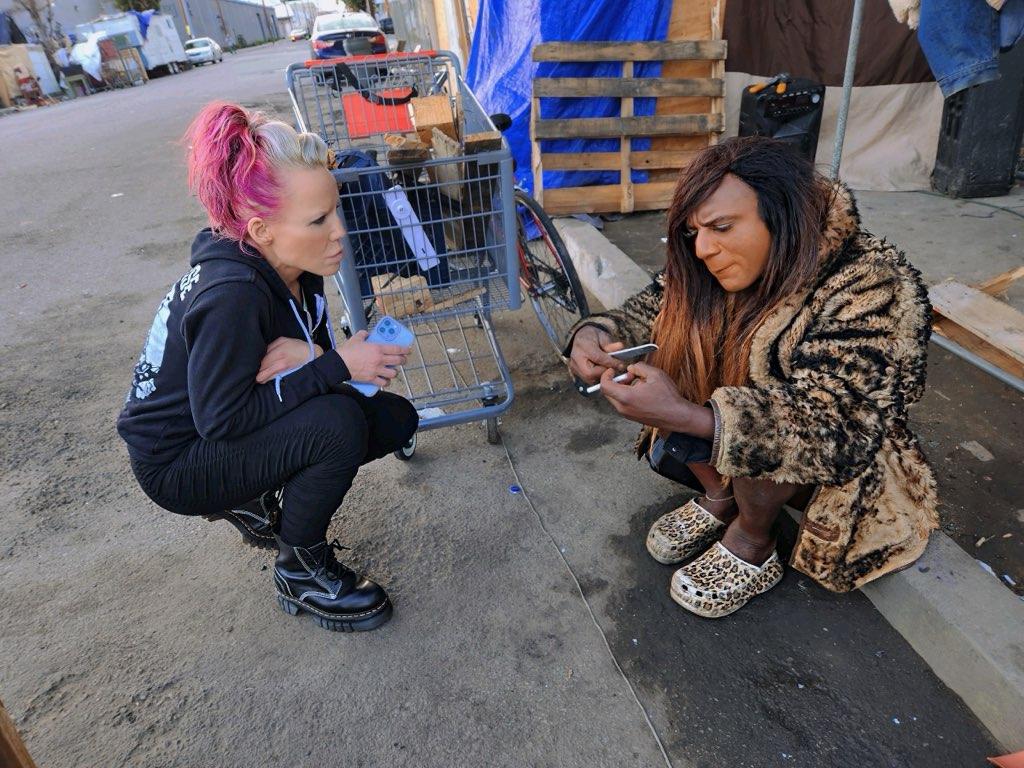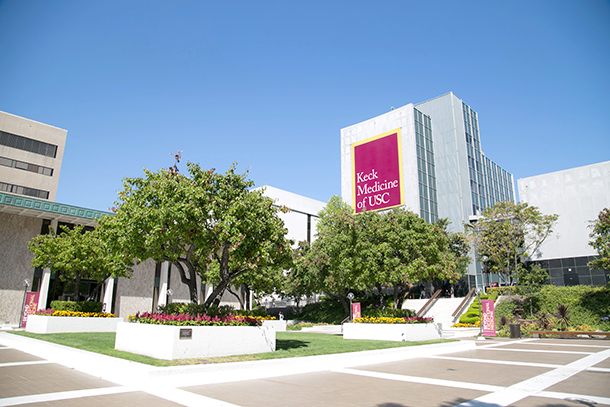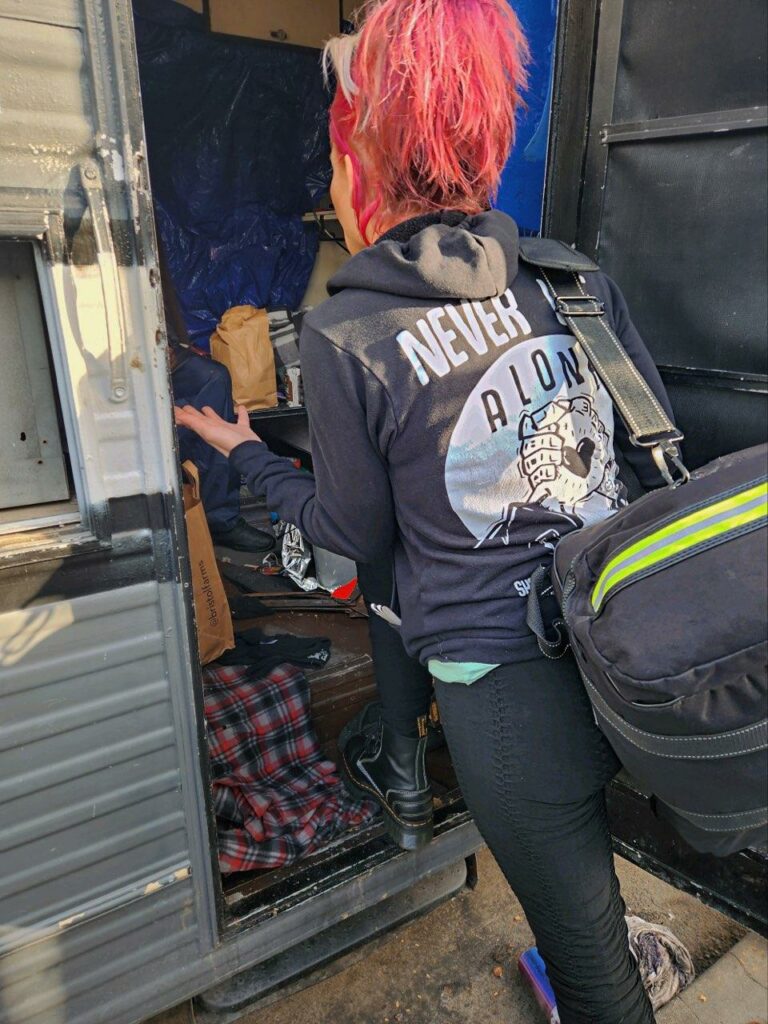Street medicine clinics bring much-needed care to L.A.’s unhoused
This is the third story in a solutions-reported series that explores the efficacy of new approaches to addiction recovery programs, especially for Black women, from the perspective of local health care providers and former clients. (Read the first and second stories here.)
Women arrive at Jen Elizabeth’s SUV seemingly from nowhere. They know her silver GMC, know Jen and, more importantly, know she is a safe person there to help. Some are faces familiar to her, others aren’t. According to Elizabeth, Street Engagement and Services Director for the nonprofit Sidewalk Project, word travels quickly about who is safe on the street.
The women, many of them trans sex workers, gather to pick out warm clothes and get food from Elizabeth. In addition to basic care items, Elizabeth often has makeup, lingerie and accessories for the women. “I’m bringing things you would want as a woman—smell-good lotion and pretty underwear,” said Elizabeth.
Bebe wears a big fur coat and makeup that Elizabeth provided to match. Jen is “an angel” for stopping by to check on them, Bebe said.

“Whole-person care, to me, is eyelashes and makeup and hormones,” said Elizabeth. These things are “just as vital as HIV medication,” she explained, “because the whole person has to feel like life is worth living in order to take medication to help them live their lives.”
But, according to Elizabeth, items like makeup, lotions, underwear and menstrual products are always in short supply because people tend to donate the basics. Food is a scarce resource during the week, when donations to the Sidewalk Project are sparse. Mobile phones and hotel vouchers are also critical necessities that are often overlooked. A hotel voucher gives clients a more stable address to receive medications and the opportunity to think about taking meds without the bigger worry of getting a roof over their head.
Successful street medicine, for Elizabeth, doesn’t just provide for short-term needs; it’s also sustainable. Meeting people where they’re at, especially unhoused people who can’t get to care, is key. The people I work with are “vulnerable,” said Elizabeth. “So, they stay in areas where it is less risky for them.
The Sidewalk Project dispatches five small harm reduction teams on Sundays, including Elizabeth working a solo route to provide HIV and trans wellness care. It’s a dream of the Sidewalk Project to have more clinicians directly involved in volunteering, but Elizabeth said clinician burnout is the main reason for understaffing.
“We aren’t a medical facility, but we are extremely linked. We have nurses and medical professionals come in and volunteer,” said Elizabeth.
Providers from local hospitals and medical schools are increasingly more visible on the streets through their own initiatives, too.
The Street Medicine team at USC’s Keck School of Medicine provides treatment for chronic conditions, substance abuse and HIV/AIDS. Clinicians and their students also coordinate referrals for specialists and housing services. Last year, the medical school began offering a class that teaches diverse health needs with a focus on community service.

UCLA Health’s Homeless Healthcare Collaborative sends vans of doctors and nurses to Skid Row monthly. Like the Sidewalk Project’s mobile street clinic, UCLA’s program meets unhoused patients where they are.
Medell Briggs-Madison, health equity, diversity and inclusion chief for the UCLA hospital and clinic system, said “street medicine” doesn’t completely encompass everything they do. “Patients aren’t just treated at encampments, but also in schools, shelters and hospitals,” said Briggs-Madison. “The program also offers direct access to social services like job training and placement, housing and food.”
Organizing referrals for patients who need higher levels of care to specialists can prove difficult, but “there’s only so much you can do inside of a community setting,” said Briggs-Madison. Imaging like CT scans or invasive procedures can’t be done “right then and there.” “You can’t do those types of things. [Patients] may need more care than what can be provided in an encampment site or in a shelter,” she said.
Cedars Sinai Medical Center’s Saban Community Clinic is built around Whole Person Care. Regardless of ability to pay, patients—many unhoused—have access to medical treatment, prevention services, wellness programs, behavioral health care and social services.
The high cost of community-based care
The positive outcomes of community care programs serving the unhoused is undeniable. The Saban Clinic served more than 22,000 patients last year and provided more than $7 million in free services, according to their 2022 impact report. Since Homeless Healthcare launched in January 2022, they have reached more than 6,000 people.
But, delivering wraparound services directly to patients through community programs is expensive. And, although university hospital-based street medicine programs and nonprofits like the Sidewalk Project do similar work, centers like the Sidewalk Project aren’t as heavily funded as bigger street medicine initiatives.
UCLA received a two-year $25 million grant to expand medical and behavioral health services for people experiencing homelessness in Los Angeles. The California Harm Reduction Initiative provided $15.2 million to support dozens of syringe services programs after legislators greenlit the state funding in 2019. Soma Snakeoil, the Sidewalk Project’s executive director, told the L.A. Times in February that the $397,000 her group received over three years allowed her group to become “a lifesaving organization.” But, that money dries up later this year.
Amid a surge in opioid deaths in California and nationwide, investment in harm reduction programs and practices is widely seen as a path forward, from county officials to public health experts. But, funding for programs like the Sidewalk Project which distribute clean needles, overdose-reversing Narcan and other harm reduction tools as part of their mission, doesn’t reflect abundant support for the cause.
Lived experience as protection and assurance
Unlike hospitals or medical schools, community nonprofits like the Sidewalk Project often see volunteers who are driven to serve because they were once there themselves.
“I lived on the street for 20 years. I’ve had these wounds, I’ve had these abscesses, I’ve had the experiences they have had,” said Elizabeth. Her ability to empathize with the experiences of patients she sees as part of the street medicine clinic allows her to give them services they might not trust others to give. That includes anything from calling hospitals for appointment referrals to handling and recommending medications or talking about intimate health details.

Elizabeth recounted her visit to the tent of a woman named Tommy who had been living on the streets for more than 10 years and had never received hospital care for her HIV. Elizabeth helped Tommy connect with a doctor over the phone. Elizabeth ensured Tommy understood the doctors’ instructions and could register herself for regular care using accurate health information. After the call, Elizabeth bought Tommy a bottled water and a protein snack box from Starbucks, her first meal of the day.
According to Elizabeth, people like Tommy who are dealing with continuous trauma on the street have difficulty remembering dates, times and locations of appointments. So, she comes to them each day in order to ensure their HIV care is consistent and reliable. While she is not a licensed clinician, Elizabeth has lived experience that informs her care of the women and men that she sees.
“You could put a Band-Aid on something, but if they don’t trust what you’re saying, if they don’t trust you, they’re not going to follow through with anything else afterward,” said Elizabeth. She said that she can “assess a person so much better” because of her lived experiences.
In addition to being there for her clients on the street, Elizabeth accompanies them to scheduled hospital visits to advocate for their care. She said she’s seen many acts of discrimination against the people in her care, from denial of pain medication because of past struggles with opioids to being told they need an address to make an appointment.
Lack of experience and education about realities on the street, especially for LGBTQ+, Black and other historically-marginalized communities, leads to bias.
“We need to really honor the fact that people that live in those experiences know better than we do. And I listen, because even though I’ve been through all those experiences, I haven’t lived the experiences of others, especially if they are a person of color,” said Elizabeth. “And I listen, and I believe them. They don’t need to prove shit to me.”

